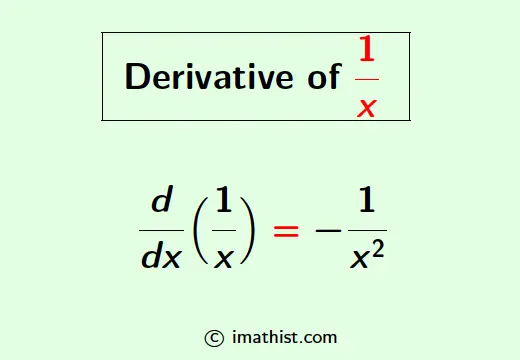The derivative of 1/x is equal to -1/x2. In this blog post, we will learn how to find the differentiation of 1/x.
Derivative of 1/x Formula: The formula of the derivative of 1/x is given by
d/dx(1/x) = -1/x2.

Let us find the differentiation of 1/x by first principle which is equal to -1/x2.
Derivative of 1/x using First Principle
By the first principle, the derivative of a function f(x) is given by the following limit formula:
$\dfrac{d}{dx}(f(x))$ = limh→0 $\dfrac{f(x+h)-f(x)}{h}$
Let f(x) = 1/x in the above limit. So the derivative of 1/x from the first principle will be equal to
∴ $\dfrac{d}{dx}(1/x)$ $=\lim\limits_{h \to 0} \dfrac{\dfrac{1}{x+h}-\dfrac{1}{x}}{h}$
= limh→0 $\dfrac{x-(x+h)}{hx(x+h)}$
= limh→0 $\dfrac{x-x-h}{hx(x+h)}$
= limh→0 $\dfrac{-h}{x(x+h)}$
= $\dfrac{-1}{x(x+0)}$
= $-\dfrac{1}{x\cdot x}$
= -1/x2
Thus, the derivative of 1/x is equal to -1/x2 and this is obtained by the first principle of derivatives.
Also Read:
What is the Derivative of 1/x?
The derivative of 1/x can be obtained by using the power rule of derivatives. Recall, the power rule of derivatives:
$\dfrac{d}{dx}(x^n)$ = nxn-1
First, write $1/x$ as follows:
$\dfrac{1}{x} = x^{-1}$
Differentiate both sides with respect to x. So we obtain that
$\dfrac{d}{dx}(\dfrac{1}{x}) = \dfrac{d}{dx}(x^{-1})$ = -1 × x-1-1 = -1/x2.
So the derivative of 1/x by the power of derivatives is equal to -1/x2.
Question Answer
Question: What is d/dx(1/x) at x=1?
Answer:
From above, we know that d/dx(1/x) = -1/x2. So at the point x=1, the value of the differentiation of 1/x will be equal to
[d/dx(1/x)]x=1 = -1/12 = -1.
So the derivative of 1/x at x=1 is equal to -1.
FAQs
Q1: What is the derivative of 1/x?
Answer: The derivative of 1/x is equal to -1/x2.
Q2: Find the differentiation of 1/x.
Answer: The differentiation of 1/x is -1/x2.